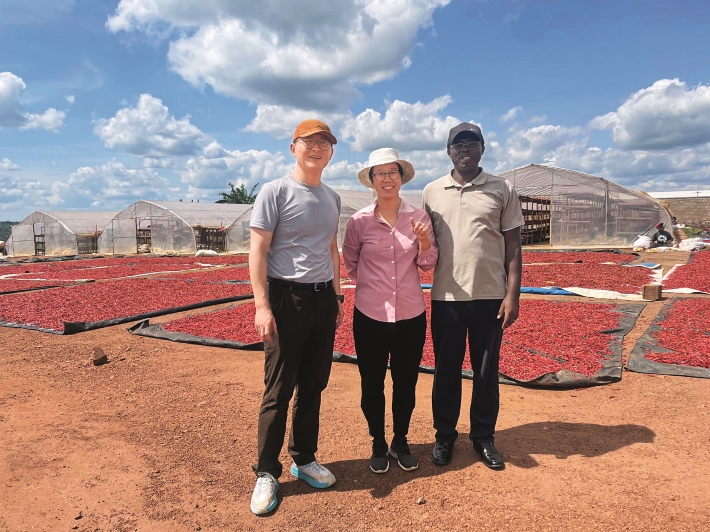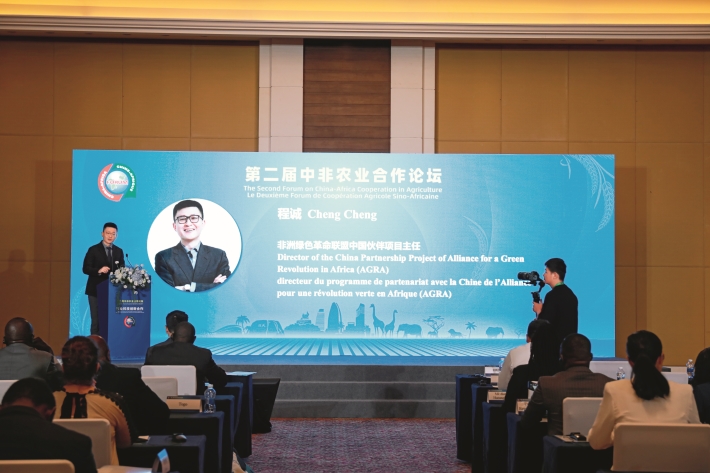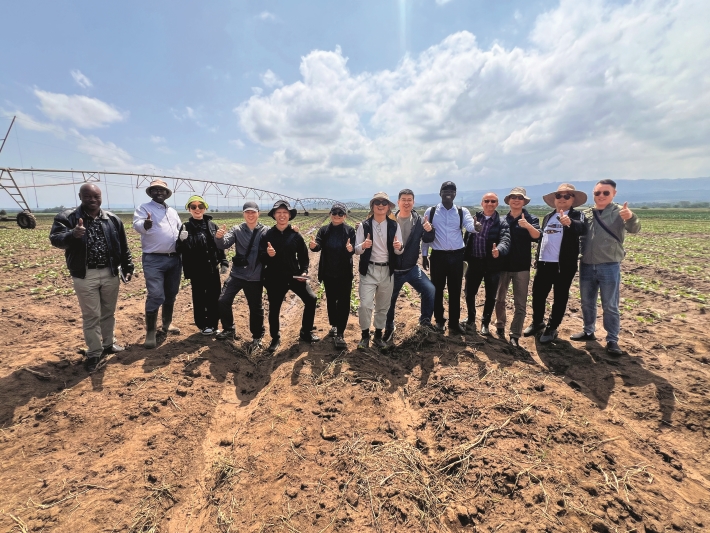|
||||||||||
| Home Top News Economy/Tech Culture/Sports China in Foreign Eyes Green Development Videos Intangible Cultural Heritages |
|
||||||||||
| Home Top News Economy/Tech Culture/Sports China in Foreign Eyes Green Development Videos Intangible Cultural Heritages |
| ChinAfrica |
| A Fertile Ground |
| The lead of AGRA’s Asia Partnerships outlines the prospects of agricultural collaboration between China and Africa |
| ChinAfrica | VOL. 16 September 2024 ·2024-09-02 |

Lead of AGRA’s Asia Partnerships Cheng Cheng (left) during a visit to the largest dried chilli farm in Eastern Province, Rwanda, in May (COURTESY)
With the acceleration of globalisation, agricultural cooperation between China and Africa has reached a new level. The first Forum on China-Africa Cooperation in Agriculture (FOCACA), held in China’s Hainan Province in 2019, gave new impetus to this cooperation. On this occasion, the Alliance for Green Revolution in Africa (AGRA), an African-led international agricultural development organisation founded by former UN Secretary General Kofi Annan in 2006, signed a memorandum of understanding for cooperation with the China’s Ministry of Agriculture (predecessor of Ministry of Agriculture and Rural Affairs).
At the second FOCACA in 2023, the two parties reaffirmed their mutual commitment. Ahead of the Beijing Summit of the Forum on China-Africa Cooperation in September, ChinAfrica had the opportunity to speak with Cheng Cheng, the lead of AGRA’s Asia Partnerships and an adjunct professor at Nanjing Agricultural University, to assess the current state and prospects of this cooperation, particularly in addressing climate challenges to agricultural development.
ChinAfrica: In what areas does AGRA plan to intensify its cooperation with China to jointly promote the modernisation of agriculture in Africa?
Cheng Cheng: First of all, it is such a privilege for AGRA to be included in the Plan for China Supporting Africa’s Agricultural Modernisation as the leading African partner, which was released by Chinese authority during the 15th BRICS Summit in Johannesburg in 2023.
Second, in cooperation with China, we are mostly looking at three pillars: joint value chain development, agricultural technology transfer and experiences sharing on job creation in the food sector for youth and women.
Third, AGRA values very much the cooperation with local governments in China. For instance, AGRA is in cooperation with Hainan Province. With Hainan’s advanced position in global agricultural science, investment and trade, AGRA hopes that the cooperation could help to increase the productivity of African agricultural, especially in the horticultural sector, and to boost agricultural trade between China and Africa.
The philosophy of the Asia Partnership in AGRA is to nurture collaborations that would bring substantial benefits for both African and Chinese, especially the smallholder farmers.
What do you think is the strategic importance of China-Africa agricultural cooperation in the fight against climate change?
Climate change is increasingly harming agricultural production in Africa. Between the summer of 2020 and the summer of 2023, there was almost no rainfall in some parts of the Horn of Africa. In Mozambique, the infrastructure damaged by cyclones Idai, Kenneth and Eloise between 2019 and 2021 has not yet been fully restored. In Kenya, climate change has brought significant change in the rain pattern. The main rainy season this year starts almost 20 days early, while the short rainy season has prolonged by at least 20 days. Since rain-fed agriculture is still predominant in Africa, these disruptions are making it extremely difficult for farmers to adapt, resulting in significant losses.
The fragility of Africa’s infrastructure, combined with its limited capacity to adapt to droughts and floods, means that agriculture is increasingly vulnerable to the effects of climate change. However, this situation also creates opportunities for agricultural cooperation between China and Africa. Together, these two partners can work to develop crop varieties that are resistant to climatic hazards, improve financial protection and insurance systems against risks, and optimise infrastructure, particularly irrigation facilities, to increase the resilience of African agriculture in the face of climate change.

Lead of AGRA’s Asia Partnerships Cheng Cheng delivers a speech at the second Forum on China Africa Cooperation in Agriculture in November 2023, in Sanya, Hainan Province (COURTESY)
What do you see as the most promising areas for Chinese agricultural investment in Africa?
For Chinese companies looking to invest in the agricultural sector in Africa, it is important to understand what is the “food system.” It is crucial to focus efforts not only on cultivation, but also on the various stages such as harvesting, drying, threshing, warehousing and even transportation. Indeed, post-harvest losses, which range from 35 percent to 40 percent on the African continent, are a major challenge to overcome, as well as a huge potential investment area.
The growing demand for agricultural machinery in Africa also provides significant potential for Chinese companies in this sector. The growth of the African economy, particularly in countries such as Nigeria, Kenya and Tanzania, is expected to generate an annual demand for over 100,000 tractors from now to 2050.
However, Chinese equipment in Africa is mainly handled by local agents, which means there is a lack of adequate maintenance and service systems. This limits sales of large and high-value products. To remedy this situation, the African Agriculture Machinery Coalition - the China Chapter will be launched in September at the African Summit on Food Systems organised by AGRA. This initiative aims to establish partnerships between Chinese suppliers and African buyers, guarantee the quality of equipment, facilitate access to financing from China, and promote cooperation in the research, development and production of machinery adapted to the needs of the African continent. The coalition is also committed to coordinating maintenance services and organising direct sales to reduce dependence on intermediaries. The aim of this initiative is to increase the competitiveness of Chinese machinery in the African market and accelerate the process of mechanisation of agriculture in Africa.

Lead of AGRA’s Asia Partnerships Cheng Cheng (left) during a visit to the largest dried chilli farm in Eastern Province, Rwanda, in May (COURTESY)
What are your expectations for future cooperation between China and Africa in the agricultural sector?
I believe that the action plan announced during the FOCAC conference in 2021 has been effectively implemented in the field of agricultural cooperation. I also hope that our various mutually beneficial initiatives will be aligned with the implementation of the Hainan Free Port. I have always believed that agricultural cooperation between China and Africa requires more policy incentives rather than just funding. Appropriate policies, judiciously applied, will yield far more significant results than the mere expansion of financial resources.
The main challenge facing African agriculture is the lack of a working market system for agricultural products. African smallholder farmers have limited incentives to increase production mostly because of the high cost of fertiliser, infrastructure such as irrigation systems, and processing equipment. And when these investments are made, the prices of local agricultural products exceed those of imports due to high costs. This disrupts the price formation mechanism and discourages production. I hope that China will be able to provide more support to Africa in terms of rural infrastructure, especially road and irrigation system, to reduce transaction costs and boost agricultural production.
| About Us | Contact Us | Advertise with Us | Subscribe |
| Copyright Beijing Review All rights reserved 京ICP备08005356号-5 京公网安备110102005860号 |